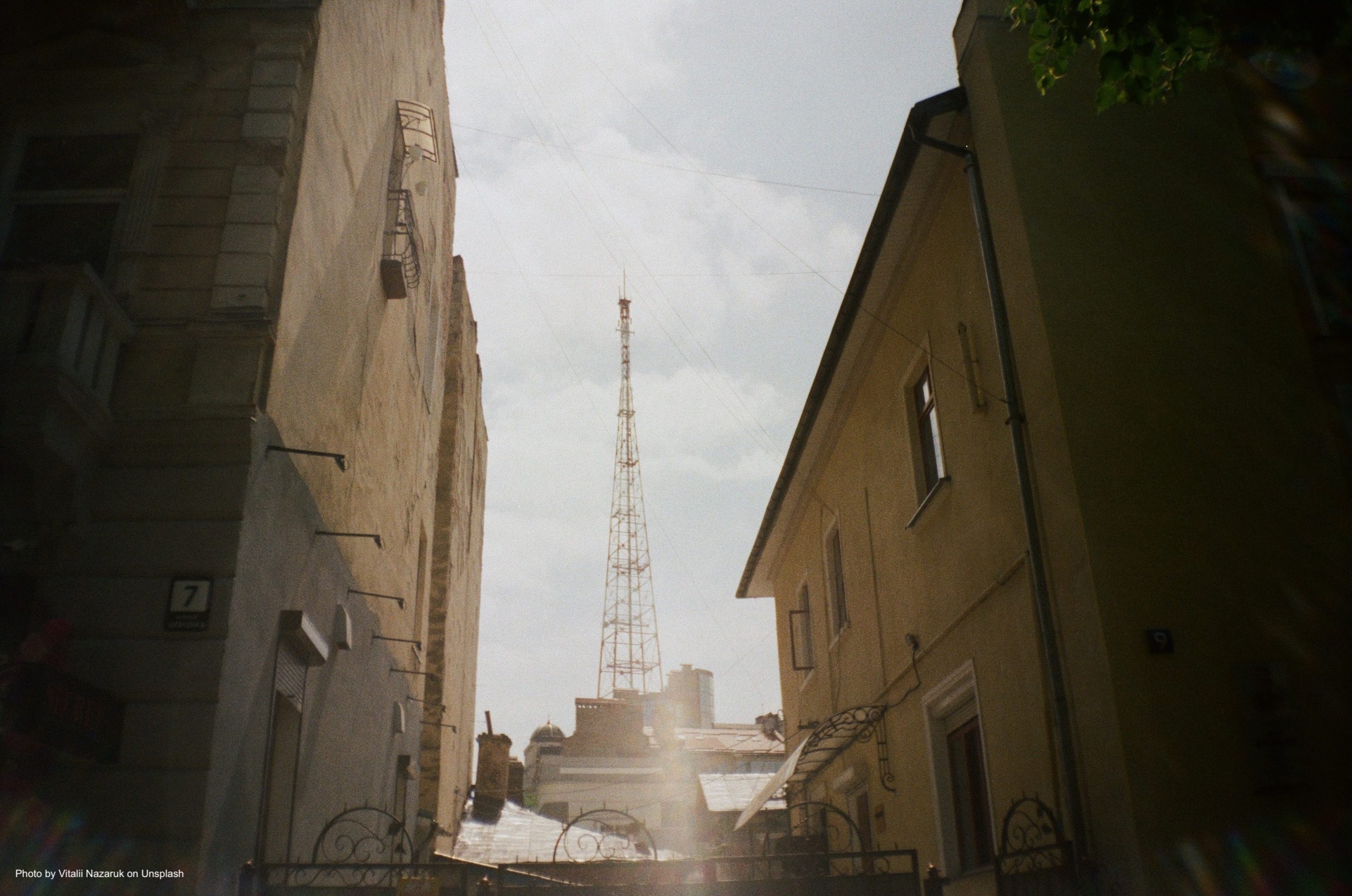Community listening is not a luxury
by Aditi Soni, Service Designer, UNDP; Jayne Engle, Adjunct Professor, McGill University; Laura Sanz, Project Coordinator, ALC
Prototyping City Learning Circle amidst Russia’s war of aggression against Ukraine
This blog is based on the experience of Ukraine cities who were part of prototyping the City Learning Circle from October through December 2022. The City Learning Circle is a series hosted by UNDP Regional Center for Europe and Central Asia (RBEC) and powered by Agirre Lehendakaria Center (ALC) and funded by the EU as part of Mayors for Economic Growth Facility (M4EG) — a joint initiative of the EU & UNDP. The City Learning Circle taps into the work of selected cities participating in the City Experiment Fund — an initiative under the Slovak Transformation Fund, implemented in partnership with the Slovak Ministry of Finance. For more information on the City Learning Circle, please see the Welcome Packet.
This blog is informed by the experiences and reflections of ALC and UNDP teams as well as interviews with the City Learning Circle participants from Ivano-Frankivsk and Kamienets-Podilskyi in Ukraine and UNDP Ukraine Country Office staff. (Some names have been changed to respect anonymity.)
Note that 19 Ukrainian cities applied to take part in the City Learning Circle, but there was only space for two. The cities who were not selected – as well as any others interested – will have access to a guide and toolkit that ALC and UNDP are preparing as a result of this process, called: Co-creating urban transformation: A guide to community listening for future-fit cities. Please fill in this form if you’d like to be notified when the guide becomes available.
Preface: Listening to the past for narratives of possibility
It was little known until recently that Ukraine has one of the longest and richest histories of urban settlements in the world (Cities in Ukraine (also called megasites) date as far back as the 4th millennium BC (see Graeber & Wengrow (2021). The Dawn of Everything: A new history of humanity. Signal)). What’s more, as revealed in Graeber & Wengrow (2021), cities in Ukraine seem to have parallel evolutions with human settlements at the opposite corner of the continent in the Basque Country. Among the earliest known in Europe, Ukrainian and Basque ancient histories of large community settlements reveal similarly built circular forms and cultural commitments to egalitarianism and governance that are far different from other early urban histories in which cities were centrally governed by bureaucracies run by kings and monarchs in various forms. These human settlement histories would seem to coincide with remnants of culture that have persisted, and perhaps even foreshadow possibilities for somewhat similar futures.
We didn’t realize this ancient coincidence between Ukraine and the Basque Country when we invited President Ibarretxe, former head of the Basque Country (and co-founder of ALC), to give the keynote talk during the first session of the City Learning Circle in October 2022. His words of advice to cities in the cohort, and Ukraine in particular, would now seem prophetic.
President Ibarretxe insisted on the importance of questions—and of changing the questions we ask ourselves collectively. He advocated that rather than asking: “How to change a country or a city?”, we should instead ask, “How to engage people to change a country, a city?”. And for him, culture is the key—as in, a culture of innovation and cooperation with a commitment to schools, education, and solidarity, in order to construct better futures for all. He argues further that societies who can make good decisions together will be able to share the benefits, and perhaps most fundamentally, will have developed capabilities for dialogue and listening. That capability to collectively listen (referred to interchangeably as deep listening, social listening, and community listening in the work of ALC) to build shared understanding about collective narratives operating in a society, contributed to the social and economic transformation of the Basque Country, which over the past 35 years has developed the world’s largest network of worker-owned cooperatives. The Basque Country has evolved as a society with one of the highest measures of equality in the world. Our Ukrainian partners in the City Learning Circle were inspired to learn from President Ibarretxe about the Basque Country’s social and economic transformation experience and curious about what aspects could be adapted to their post-war reconstruction.
I. Why are listening & learning critical, even—and perhaps especially—in crisis conditions?
Societies around the world are caught in vicious cycles of distrust and disjointed thinking, and action. In many ways and for many reasons that relate to shifting political landscapes, broken information ecologies, climate and energy crises, violent conflict, and more, it is difficult for communities and societies to listen well to one another, to engage in dialogue, and to understand perspectives of people who have different backgrounds and views. Increasingly, people are navigating social contexts with polarized assumptions about what is happening and what is true. Societal mistrust is contributing to societal breakdown that shows up in all sorts of ways — from polarization and social isolation to increases in violence and war.
In this context, on February 24, 2022, Russia invaded Ukraine from the south, east and north, bombing more than a dozen cities. So began Europe’s largest land war since World War II. Immediately in those early days, UNDP’s Ukraine Country Office moved into gear to support local communities. The M4EG country team in Ukraine was well-equipped to respond, since they had already been working on
community infrastructure rebuilding in eastern Ukraine from armed conflict, as well as supporting decentralization efforts with regional governments across the country. In the early days when Ukraine declared marshall law, the M4EG team responded to partner municipalities’ learning needs about how to continue to manage communities and deliver services in the new context. And the need for learning didn’t stop there — Mustafa Sait-Ametov, M4EG country team lead in Ukraine, remarked that municipalities have seized learning opportunities to make their cities better, including responding to our City Learning Circle invitation.
Why does community listening matter, including in crisis conditions? In relatively peaceful times, Community Listening approaches and tools help deepen understanding of local narratives and perceptions, which contributes to collective intelligence building regarding a city’s social reality and desired and imagined futures. Narratives inevitably influence the interventions that municipal teams develop, and thus become essential to take into account when designing and implementing actions. Moreover, listening, coupled with processes of deliberation and co-design with citizens, can contribute to evolving shared narratives for change and creation of urban transformation portfolios that are ‘people powered’. Community Listening can also provide a robust foundation for civic change, and narratives of the past and present are revelatory for how people imagine future transformation. In times of crisis, these processes need to be adaptive to the situation. In the case of the two Ukraine cities in the City Learning Circle, participants chose to dive in and accelerate the testing of Community Listening approaches in order to address pressing problems in ways that directly engaged people and included perspectives based on their current lived realities
Cities are ground zero in this war, and even those who are not being invaded directly are coping with large numbers and flows of displaced peoples and businesses. This massive migration not only requires new strategies for addressing immediate needs and reconstruction planning, but also has a deep impact on people’s lived experience in cities. The fact that the war is urban, and displacement is happening primarily in cities portends, those cities will be particularly important for the post-war reconstruction strategies.
In this context, UNDP extended an invitation to Ukrainian cities to take part in the City Learning Circle, which we designed to address two main questions:
- Can the structure and method of a multi-city, transnational City Learning Circle provide an effective way to engender peer-to-peer learning and stronger relationships between cities?
- How can the community listening tools be improved and adapted to assist cities in Eastern Europe who want to learn these practices as part of a more adaptive governing system that responds more efficiently to real time needs and today’s complex problems?
The flow of the City Learning Circle consisted of three full cohort sessions, punctuated by mentoring sessions with each city team in between to support tool testing and address city teams’ questions on theory, methods, and practical applications. The next section covers outcomes and learnings from the experience between October and December 2022.
II. Ukraine cities’ experience and effects
Ukraine cities jumped at the chance to take part in the City Learning Circle; UNDP expected applications from four or five cities, so we were all surprised to receive 19 applications. “There’s a huge demand for new knowledge and learning, even during the awful situation of war,” said UNDP Ukraine colleagues. Amidst violence, displacement, and the continued crisis context, we wondered why there was so much demand for learning in general and for community listening in particular. We asked participants from the two cities who were selected what motivated them to apply, and they told us that they were driven to learn more so that they could improve their cities and their work and build trust and capabilities that would help strengthen post-war rebuilding. Following are two examples.
“We are right now in a turning point because immediately after the war is over, there will be a huge wave of renaissance of restoration processes and activities and I want to be ready for it.”
Volodymyr, Kamianets-Podilskyi team
“My motivation, first of all, is to improve my work. What does it mean? It means to arrange effective communication and cooperation between resources and our local community. Information received during this City Learning Circle was used to develop the most effective solutions and we are going to use it further and further.”
Irina, Kamianets-Podilskyi team
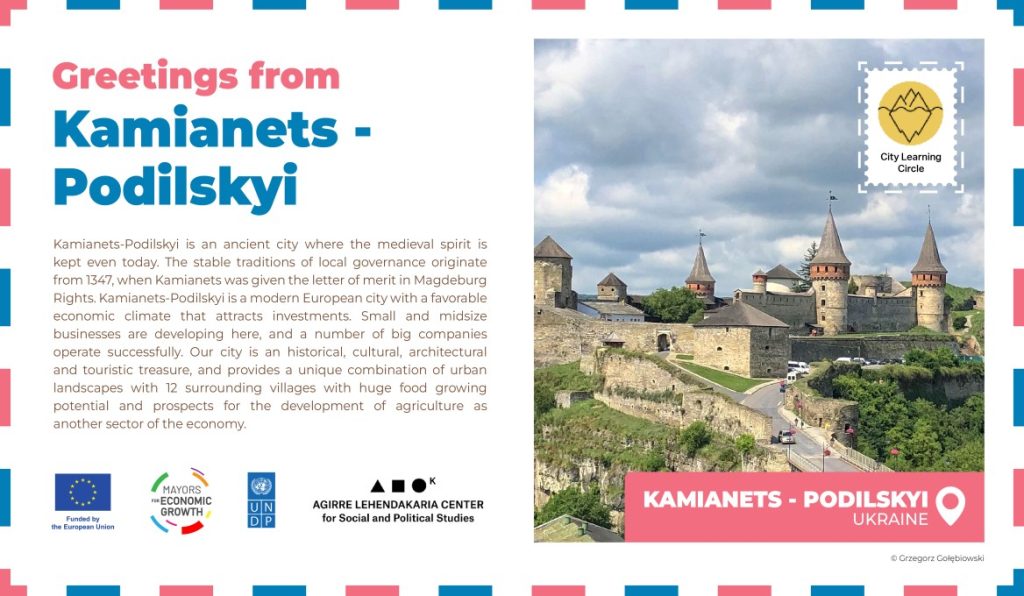
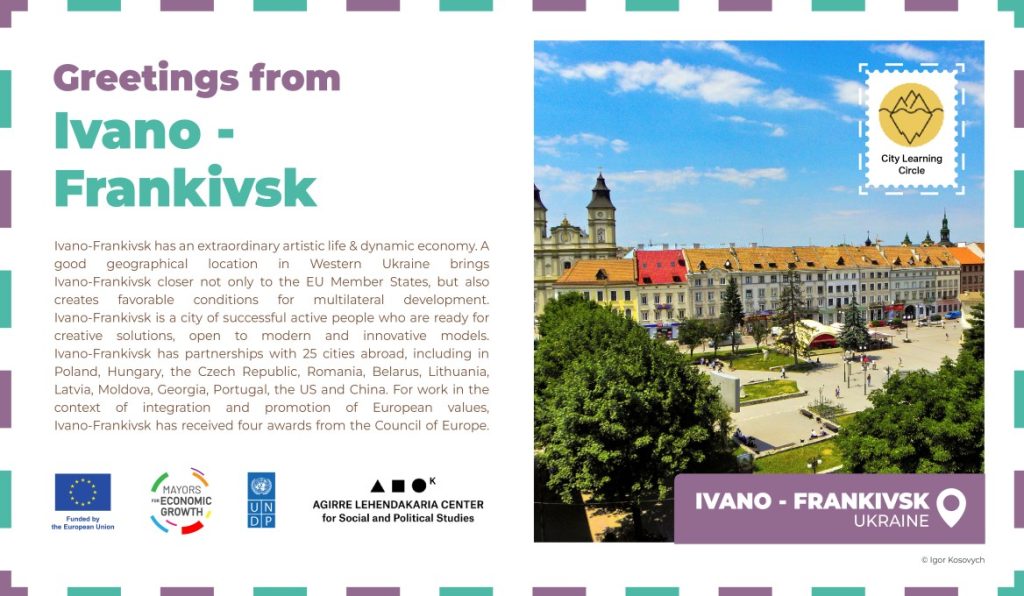
Participants in both selected cities, Ivano-Frankivsk and Kamianets-Podilskyi, consisted of municipal staff from different departments as well as civil society representatives. The cities are both located in the western part of the country, and in spite of their massive workload increase resulting from the arrival of internally displaced people, families and businesses, the teams engaged deeply in the City Learning Circle right from the start. Participants attended group sessions and one-on-one mentoring meetings, and they diligently carried out community listening and narrative analysis exercises in between sessions with support from ALC. City teams reported outcomes on five levels:
Effect 1: Deeper understanding of residents’ lived experiences and clearer analysis of local narratives—both visible on the surface and less obvious hidden narratives and metanarratives—operating in each city.
“We need to constantly learn, constantly find out new things, constantly engage in learning processes. These learning processes [in the City Learning Circle] united us and showed us real processes happening in our city, such as the daily-life challenges of single moms, young people, and internally-displaced people and businesses from the East.”
Yelyzaveta, Kamianets-Podilskyi team
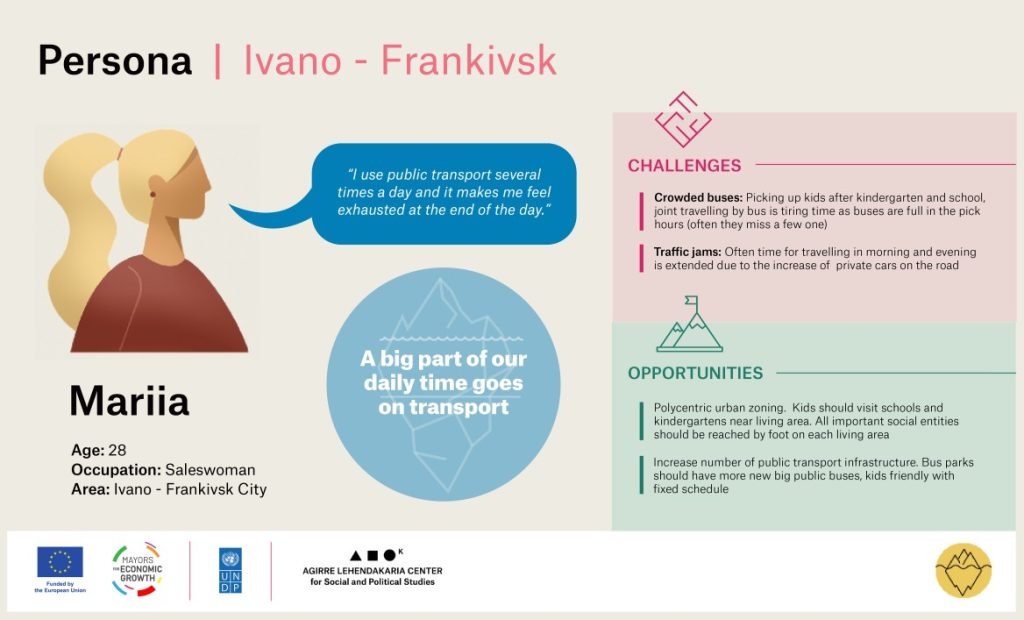
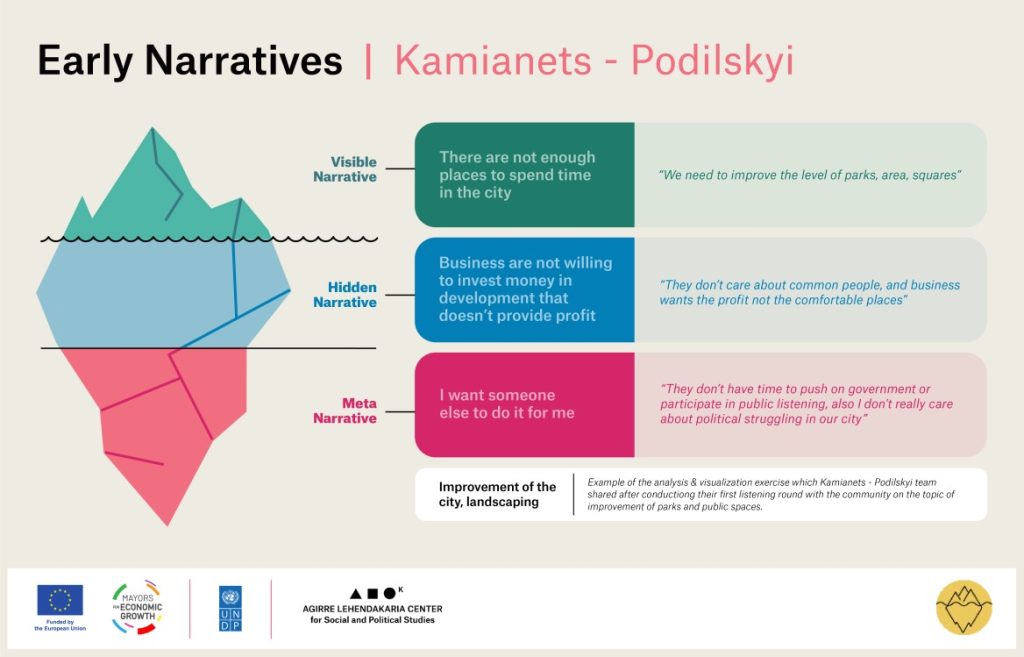
Effect 2: A sense of solidarity and visceral feeling that Ukraine is not alone.
“Participation in the City Learning Circle was, for me, proof that Ukraine is not alone. I mean, it seems that the whole world supports Ukraine in such difficult times. And of course, it gives strength. It gives us understanding that we are supported in such a way, giving us new knowledge, giving us new mechanisms.”
Irina, Kamianets-Podilskyi team
Effect 3: Inspiration, strength, and learning from the diversity of city teams: multigenerational, multidepartmental, multisectoral, and gender diverse.
“It helps me to have the possibility to work in such a diverse team of specialists, which includes young specialists, youth which include special representatives of civil society and many others. It’s just amazing.”
Irina, Kamianets-Podilskyi team
Effect 4: New ideas for the municipalities and new ways to listen to citizens, based on ALC’s tools and approaches.
“The City Learning Circle gave us a lot of ideas. Many of the ideas we have already started to implement into some processes and into some new channels. For example, we have new listening channels, among which is the Council of Civil Activists, that help us to get a better grasp of communities’ and society’s tendencies and worries. […]The experience which we have gained during this learning process can’t be undervalued and underestimated. We have already used various mechanisms which we have learned during the last months, and we plan to extend our existing mechanisms and to develop new ones.”
Irina, Kamianets-Podilskyi team
Effect 5: Changed ways of seeing and greater insights based on sharing experiences with other cities in the cohort, both within Ukraine and from city teams in Kosovo and Armenia.
“For me personally, it was interesting to find out about problems and challenges that exist, especially abroad. On the geopolitics level, it’s always important to understand what the realities are, their real challenges, what are their pains, so to say, because you can’t find it out from the news or from mass media. But on the Ukrainian level, it was interesting for me to find out about some successful projects in other cities. In a good sense that’s a competition, like: ‘Oh, they have this good idea, or they have this good project’. It’s nice to pilot something similar as well.”
Yuliana, Ivano-Frankivsk team
The outcomes were particularly encouraging given the hardship and tension of the war. Our meetings were frequently punctuated with dreaded air raid sirens. Comments like this at the start of meetings were common:
“[…] Municipal offices and administrative buildings are always in danger during air attacks. So, if there is an air raid alert, we will need to go and take cover,” said a participant, Ukraine municipality.
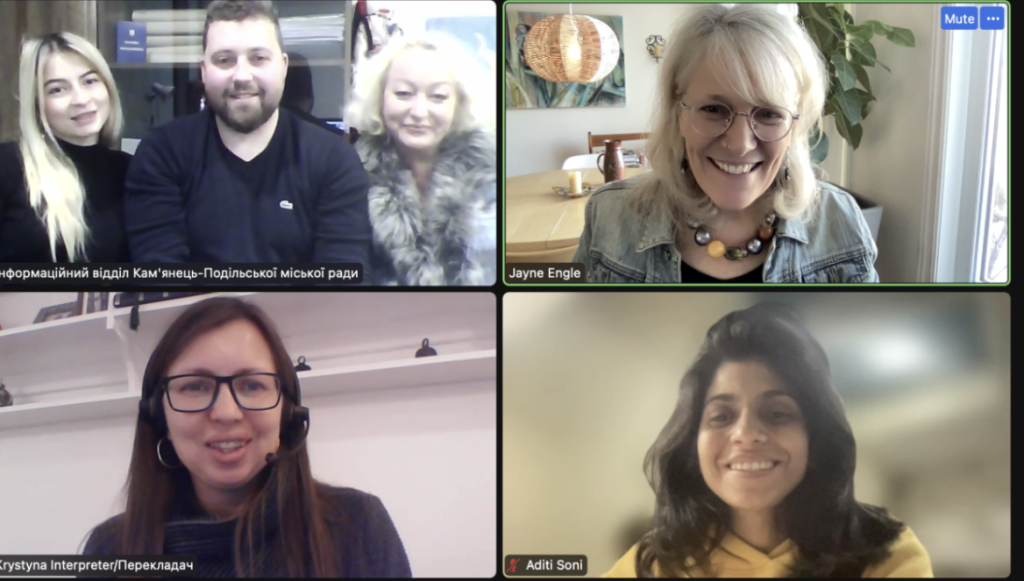
III. Learnings from design and prototyping of the City Learning Circle
Besides learnings embedded in the direct outcomes above, we lay out below what we learned about: a) early evidence of culture shifts in the Ukraine municipalities; and b) what worked well with the City Learning Circle design, as well as limitations.
Learnings about culture shifts we observed during prototyping City Learning Circle
Learning 1: Relational culture of unity and solidarity, local trust, and fighting collective depression.
A number of participants remarked that relationality and trust building both among citizens and between citizens and municipal government were already being strengthened as a result of prototyping Community Listening. In one city, we observed seeds of strengthening relational culture particularly with some of the most vulnerable people in the city, including single mothers and their children and internally displaced peoples (IDPs). One participant also shared that Community Listening helped to fight collective depression:
“Social listening constitutes an important element of this, of all our efforts, because I need to say that society now is quite depressed either because of the economic challenges and not only economic ones, because, for example, today we have a mourning day. We buried one of the heroes who died just today.”
Irina, Kamianets-Podilskyi team
Some city staff felt that the Community Listening went even further to contribute to building a culture of unity and solidarity in the city. Besides the direct, individual listening the team prototyped, they also began social media chats and invited young people and single mothers to share their experiences, challenges and aspirations. This contributed to the city’s ability to develop a set of ‘personas’ (ethnographic profiles, representing archetypes of lived experiences in the city, which then informed the municipal budgeting process for 2023 (as mentioned below).
“Just yesterday we approved the municipal budget for 2023. […] Thanks to inspiration during City Learning Circle we included in the budget different support and benefits allowances for all these categories of our local population, which actually constitutes this persona of the person in their highest needs, and inspired by the mechanisms and processes we learned from you,” continued Irina, Kamianets-Podilskyi team. “That’s a communication possibility for people. We started to develop the persona exercise with single moms, with children during the process, and it brought us to a variety of sectors. For instance, water supply, heating supply, wellbeing of the city and planning of public services, which actually were initially developed for single moms. We have learned more efficient and empathic ways of communication.”
Learning 2: Realization of the importance of narratives and desire to deepen analysis to understand hidden and metanarratives in the city.
Among the different Community Listening tools on how to gather and get to the core of local perceptions, we presented ways of accessing different levels of local narratives.
- Visible: Public discourses and what people say openly;
- Hidden: Something hidden behind the textual discourse; and
- Metanarrative: Deep community beliefs that result in revealing Visible and Hidden levels.
These perceptions at three different levels have a decisive influence on what is believed to be possible or not in a community, and can even determine the success or failure of socio-economic initiatives implemented for city transformation.
“It’s extremely important to understand the deep needs of citizens and it’s extremely important to know how to actually start, and how to handle your communication in order to move quickly from visible narrative and needs into the deep and hidden narratives. These listening skills need extensive training. Of course, we need to train and to learn how to do it more effectively.”
Yuliana, Ivano-Frankivsk team
Learning 3: Growing sense of European identity of Ukrainians.
One city team shared how local culture is changing in that people within their community feel a stronger sense of what it means to be European and the importance of understanding that narrative and its implications.
“Each Ukrainian now feels and wants to be European and to understand how it is to be European and what are important things for Europeans,” stressed Irina, Kamianets-Podilskyi team.
Learnings about the City Learning Circle design—strengths and limitations
Learning 4: The City Learning Circle proved to be a highly adaptive and adaptable container, both for cities who were completely new to Community Listening and analysis processes, as well as for those more experienced.
The alternating sessions of the full group of four cities, followed by one-to-one city mentoring sessions seemed to respond well to Ukraine cities’ needs and accelerated their learning evolutions. The ALC and UNDP teams continually adapted session design to address what we heard from city teams along the way.
Learning 5: City teams that consisted of representatives of a mix of sectors, genders, seniority of city staff, and civil society partners seemed to be able to engage most deeply.
Both cities in Ukraine incorporated such representation. A department head and elected representative in one city marked how enriching it was to have young people in the team with diverse interests and enthusiasm for the work as well as deep commitment to improving their city.
Learning 6: Participants appreciated transnational engagement—not only from the city teams who represented three different countries, but also that the hosting organizations (ALC and UNDP) were multinational.
“International cooperation is extremely important, because it helps us to develop ourselves. It helps us to understand what we lack and what we have in excessive amounts, what we could use, or change, or even build from scratch. With such international communication, we got extremely crucial support. during this difficult time for us and Ukraine,” commented Yelyzaveta, Kamianets-Podilskyi team.
“From the very beginning, when we watched and listened to your presentations, learning about different problems and solutions abroad, it helped me to see that some challenges are quite similar here and in Armenia or Kosovo. At the same time, we have quite a few successes and lessons learned to share with colleagues. Take for instance our good touristic areas, while others have well developed parks and transportation areas. See, we could share our experience and ideas to learn from each other,” said Volodymyr, Kamianets-Podilskyi team. “It would be great to learn how they made such great parks. Or we could share our experience in the tourism sector. It’s extremely important to get out of your information bubble, to learn something new from foreign cities. And so that’s why direct communication with other cities is extremely important in order to give the possibility of experience exchange.”
Learning 7: Participants remarked that the friendly, warm, collegial, and inspiring atmosphere of City Learning Circle meetings put them at ease and facilitated learning, particularly considering that concepts seemed confusing and foggy at the beginning.
The convivial vibe and frequent ALC support helped to relax participants and speed up the learning process, so that by the end, participants had confidence in their knowledge and capabilities to use the tools more regularly and adeptly moving forward.
“For me, it wasn’t clear or obvious in the very beginning. I just didn’t understand anything. Then, amid the process, I started to understand some basic rules and principles, and as result I learned that these are very simple and useful tools to apply in practice.”
Volodymyr, Kamianets-Podilskyi team
“You prepared all the information for all the lectures, and the atmosphere was extremely friendly. And after every meeting, we were so inspired. We created different things and mechanisms such as community and youth chat groups and communication tools,” mentioned Yelyzaveta, Kamianets-Podilskyi team.
Learning 8: For improving or scaling the City Learning Circle moving forward, we’d suggest addressing giving greater thought to several aspects of design: duration, language, and technologies.
The short duration was somewhat limiting as ALC was not able to train and coach on the full set of processes of its community engagement framework/social innovation platform system, which includes: Community Listening, Collective Sensemaking, Co-Creation, and Co-Design of people-powered portfolios. It is more beneficial to cities to have a full understanding of the systemic approach with opportunities to prototype the full set of processes. Secondly, operating in multiple languages and translating documents when the time is condensed proved to be challenging. And thirdly, the tools and learning technologies could be reconsidered next time, and perhaps coordinated with other technologies the city teams are already using or would like to learn.
IV. Where’s this going?
Municipalities understand the critical role of community listening, and they value rapid, adaptive learning, building new capabilities, and connecting more meaningfully with other cities inside and outside Ukraine. To sustain solidarity and reconstruct for social and economic transformation and long-term futures, community listening will be a tremendous asset.
Successful recovery of Ukraine requires strong relationships of trust: community listening is an essential basis for trust and relationship strengthening as part of a larger strategy of generating people-powered portfolios for social and economic transformation
What is the role of cities in Ukraine’s future? For Mustafa in UNDP’s Country Office, cities and regions are critical and will become even more so through continuing the process of decentralization started before the war.
“What would be the role of cities [in the future]? It will be maybe the most important factor—the capabilities of municipalities, and I mean, not only local authorities, but also strong local partnerships for recovery and for development. We’re all kind of orchestrators of the development processes at the local level… Even now we can predict that such cities will recover quickly. And we see all the signs that we will be able to build back better, much better than before. These cities have very progressive and open-minded thinking, and they have the ability to attract and engage partners, mobilize funds and implement their projects. And so there will be, I think, a lot of prominent examples, but there will also be other problems with the cities which require capacities to be built.”
Mustafa, UNDP Ukraine
Mustafa is committed to cohesion and inclusion of all communities.
“The primary task for them [cities in eastern Ukraine] will be to save their communities, to maintain a sense of community and make efforts to bring people back from where they are now in the western part of the country where the situation is different. [The western cities] have seen a significant influx of population, so the pressure on social infrastructure is enormous. Also, they need to find a way to create new jobs and economic opportunities for people who would like to reestablish their lives in their new communities. There are different levels of these issues. In general, I would say the primary factor is internal cohesion of the communities, trust between and within communities, and trust between local governments and others,” added Mustafa, UNDP Ukraine.
According to Mustafa, one thing is sure: for communities across Ukraine, listening and learning are not luxuries — there is constant demand from municipalities and regions for new knowledge, and UNDP, together with its partners, is doing their best to help meet those needs.
Postface: Listening to emerging futures in Ukraine
The war in Ukraine is not over, but the profound courage, solidarity and shared narratives of her inhabitants and her history foreshadow futures of reconstructing a stronger network of cities and regions. Already before the war, processes of decentralization were well underway, and they are expected to resume during reconstruction. The work will be immense—particularly for communities in the East, and new forms of social infrastructure and economic cooperation will be essential. Collective construction of future narratives, resulting from community listening, can contribute to change, as was the case in the Basque Country transformation in the 1980s and 90s.
Historically, both Basque and Ukrainian societies avoided heavy central bureaucracy, and seemed to develop complex systems to govern themselves in self-conscious egalitarian ways. In the Basque case, this became a complex and robust system of economic cooperation and community care, and we can see evidence that these narratives persist even today.
Ukraine will build cities again, and in new ways, that are fit for the future — evolving culture, strengthening social cohesion and economic cooperation. This will require a great deal of collaborative work by cities and communities right across the country.
What futures are emerging in Ukrainian cities? Deep community listening is already revealing possibilities.
“We have one hope for all Ukrainians, for all Ukraine — it’s our victory. All other hopes will be definitely achieved after this. Everything will be restored. Certainly, community listening will be a key element during all these processes,” said Yuliana, Ivano-Frankivsk team.
Disclaimer
This publication was funded by the European Union. Its contents are the sole responsibility of the Mayors for Economic Growth Facility and do not necessarily reflect the views of the European Union.
The M4EG Facility draws on the Mayors for Economic Growth Initiative, launched and funded by the European Union (EU) in 2017. Since 2021, the EU-funded M4EG Facility has been managed by UNDP in close cooperation with the EU, local authorities and a range of partners.
Special thanks to Mustafa Sait-Ametov and Tamara Kharchenko, UNDP Ukraine, and to the Mayors and city teams of Ivano-Frankivsk and Kamianets-Podilskyi, especially participants .

